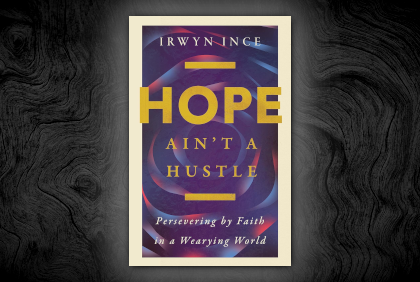7 Stabilizing Principles in a Chaotic World, Part 7
Image

Read the series.
Number 7: Fellowship. You need those people who disagree with you.
Believe it or not, one year I played football. American football. I was an offensive lineman.
Pop Warner League. Seventh grade. Weight limit was 110 pounds at the top, 75 at the bottom. I was 2 pounds too light, but they let me play anyway.
We called ourselves the Patriots. (We were in a Boston suburb.) We lost every game but one.
That experience didn’t jump-start my career, but it did teach me a lot of things. Most important, it forever changed my thinking about diversity.
As with any team sport, football has different positions, and they have different requirements. The offensive lineman has pretty much one job: be a wall. Protect the quarterback. Give him 2 or 3 seconds to get the ball where it needs to go.
So what does an offensive lineman look like? He’s big. Really big. 350 pounds big. His job is to get in the way and stay there.
Out at the far end of the line is the wide receiver. What’s his job? Get down the field—sometimes waaaay down the field—and catch the ball. And then run with it. He needs to be fast. And agile, to out-maneuver the defensive secondary. And it helps if he has some vertical reach so he can catch a broader range of passes.
So what does he look like? He’s not 350 pounds, that’s for sure. He’s thinner, more like an Olympic sprinter, and he’s usually tall, with an ability to jump. And he has great hands.
Now, which of those body types is better?
Neither one, obviously. They’re both necessary for the success of the team. You put an offensive lineman out at the wide receiver’s position, and he’ll be worn out after 2 or 3 plays. You put the wide receiver in at left guard, and they’ll be carrying him—or the quarterback—off the field in short order.
You need them both, and you want them both. It’s the diversity that makes your team great.
What about church? What about life?
It’s human nature to want to be with people who are like you. They look like you, they think like you, they live like you. Other people are unwise, or icky, or nuts. Anybody who drives faster than you is a maniac; anybody who drives slower is a moron. So we go to church with people like us.
And our church is all wide receivers, or offensive linemen, and we wonder why we don’t win any games.
You need to surround yourself with people who are different from you. Sure, racially different—whatever that means—but different in the more important ways as well. Different in the way they think. Socially different. Culturally different. Politically different.
Different, in significant ways.
Why?
Because you’re not good at everything, and you need them to be good at whatever you’re not. You need their strengths, their insights, and especially their correction. You need them.
For many years I was on the elder board of my church. As we wrestled with hard cases and difficult decisions, I came to appreciate the fact that we had different kinds of people at the table.
We had men with the gift of mercy. They would bring a situation to the table: here’s someone who doesn’t have enough to eat. And they would weep, and they would say, “We need to help this family!”
But we also had men without the gift of mercy. They would listen, and they wouldn’t weep. And they’d say, “Why do they not have enough to eat? Is it because he’s foolish with his money? And if so, should we be giving him more money? How about if we buy him a bag of groceries, and then have one of the financial advisers in the church give him some pro bono help setting up a budget and learning how to stick to it?”
(I’ll let you guess which of those groups I was in.)
Now. Which of those people on the elder board is more important?
You need them both. You need the one who weeps, and you need the one who doesn’t. They both make you a better team.
Now let me place the rubber on the road.
When families are being separated at the border, you need people with the gift of mercy, and you need people without it.
You need people who get righteously angry at the suffering that’s going on. You need people who call down a system that takes 3-year-olds to court. Without their parents.
But you also need people who say, “These people are in this predicament because they broke the law. And if we subsidize their behavior, we’re going to get more of it. And that’s not good for us, and it’s most certainly not good for them. We ought to do what we can to discourage this kind of behavior.”
You don’t need to be all in at either pole—you probably shouldn’t be. But you should listen to them.
And we—we—should work together to bring about a system that works.
We can’t do it without each other.
Dan Olinger Articles
Reposted with permission from Danolinger.com.
Dan Olinger Bio
Dr. Dan Olinger has taught at Bob Jones University since 2000, following 19 years as a writer, editor, and supervisor at BJU Press. He teaches courses in theology, New Testament, and Old Testament, with special interests in ecclesiology and the Pauline Epistles.
- 66 views

Discussion